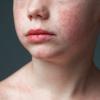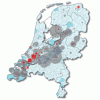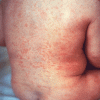Measles is one of the most contagious diseases still in existence. It is caused by the measles virus. You can get measles if you have not had the disease before, or if you have not been vaccinated against measles. Children can be vaccinated against measles. As a result, the disease is no longer common in the Netherlands.
How might I catch measles?
The measles virus is found in the throat of an infected person. When a person with measles coughs or sneezes, tiny droplets containing the virus are expelled into the air. If other people inhale the droplets, they could become infected.
People can transmit the virus as soon as the first symptoms start. They remain contagious for up to 4 days after the measles rash first appears.
Measles is one of the most contagious diseases still in existence. It is much more contagious than flu, for example. The incubation period between exposure and illness is 7 to 14 days. It usually takes 10 days to start showing symptoms.
How can I prevent measles?
There is a vaccination against measles: the MMR vaccination. This vaccination is offered to children in two doses: at 14 months and at 9 years. It also protects against mumps and rubella. The MMR vaccine has been in the National Immunisation Programme since 1976.
Children who have not yet been vaccinated against measles can still catch up on the MMR vaccinations until their 18th birthday, free of charge. To get vaccinated, make an appointment with your local Youth Healthcare Services.
Adults who have not had measles and have not been vaccinated against measles can also be vaccinated, at their own expense. Contact the Municipal Public Health Services (GGDs), your family doctor or a vaccination clinic for more details.
Once a person has had a measles infection, they cannot get the disease a second time. Sometimes a person who has been vaccinated against measles still gets an infection, but their illness is usually less severe.
Is there any treatment for measles?
There is no treatment for measles. The body has to clear the virus on its own. Most people feel better after 7 to 10 days. Some patients develop more serious illness. Call the GP if you suspect that you or your child have measles.
How common is measles in the Netherlands?
A vaccination against measles has been in the National Immunisation Programme since 1976. Before the measles vaccine was introduced, almost everyone got measles in childhood. The Netherlands had hundreds of thousands of measles patients every year.
Since we started vaccinating children against measles, the disease has become much less common. There are usually 10 to 20 patients a year. Many of these have been in a country where measles is more common. There is an epidemic about once every 10 to 15 years. When that happens, measles is most likely to spread in areas where fewer people are vaccinated. The last measles outbreak in the Netherlands was in 2013/2014. During that outbreak, more than 180 measles patients were admitted to hospital. One 17-year-old girl died of the consequences of measles. RIVM is closely monitoring the spread of measles and posting updates on the current situation on the website.
Can a person with measles go to childcare, school or work?
No, a person with measles cannot go to children, school or work. If you suspect that your child has measles, keep the child at home and call the GP.
If your GP says that your child has measles, tell the childcare provider or teacher. They can consult with the Municipal Public Health Services (GGDs) to notify other parents.
If you are an adult and suspect you might have measles, stay home and call your GP. If the GP says that you do have measles, consult with the company doctor, the GGD or your employer before returning to work.









